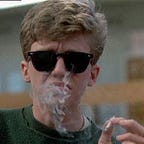The Magician (1958)
Ingmar Bergman’s 1958 Anisktet (translated from Swedish as The Face, released in the west as The Magician) is an exploration into the nature of illusion, artistry, love, and reality. Shot in a crisp contrasting monochrome, we follow a 19th century traveling Swedish “Magnetic Health Theater” group as they are forced by aristocrats, scientists and lawmen in Stockholm to prove the veracity of their supernatural claims. Their leader and self-proclaimed magic healer/illusionist, Vogler (Max von Sydow) lives as a mute and dons a dyed black wig and matching false goatee to sell his persona. His androgynous apprentice, Aman (Ingrid Thulin) is actually his wife, Manda, while his nameless witchlike grandmother (Naima Wifstrand), smarmy spieler Tubal (Åke Fridell), and indifferent coach driver Simson (Lars Ekborg) round out the rest of the troupe. Their main antagonist is the fiercely rational Doctor Vergerus (Gunnar Björnstrand) who wants desperately to perform an autopsy on Volger, to expose his magic for childish trickery.
The Magician is a deeply personal film specifically in regards to the filmmaker’s relationship with his audience. It is a film of duality, of extreme darkness and superficial comedy. Volger can be read as a self-insert for Bergman as a director, one who is all too aware, perhaps even consumed by the facade he presents for a living. Geoff Andrew perfectly describes the film as “one of Bergman’s portraits of the artist as an all too human, less than wholly honest manipulator of others”. Volger’s mask of silence, his more literal mask of the wig and facial hair, these are wardrobe for the magician’s part he plays. His entire being is one of deception, manipulation. The first words he speaks are resentful: “I hate their voices, their bodies, their movements, their voices, but I am also afraid.” To take this line as reflective of Bergman’s feelings toward his audience would be foolish. However, it points to the insecurity of all artists, the chains by which they are bound to audience analysis and reception. He, much like a filmmaker, is trying to convince his audience that what they are seeing is real — whether it is “real” or not is of no consequence, it simply needs to appear so. In this way we can view Vergerus as a rather persistent critic, a man so stuck in his ways as to wholly reject the idea that the art of a magician (or filmmaker) could be “real”.
There is a heavy theme of death that hangs over The Magician, the story opens with the troupe picking up a dying actor in the woods. The actor, named Spegel (the Swedish word for mirror) longs for a knife that will free his “so-called spirit” from his “meaningless cadaver”. Spegel touches on a Shakespearean theme, that we are all but actors on the world’s stage, our outward presentations meaningless, amorphous costumes to hide the spirit inside. Spegel speaks bluntly, gruesomely, and the audience is then stuffed into claustrophobic shots of the carriage ride where Spegel, Tubal and Aman squabble about the nature of reality before Spegel’s first death in the film. I would also be remiss to note that what we first are told to be the hauntings and wailing of ghosts or demons in the forest is immediately revealed to be nothing more than a dying man — perhaps Bergman’s cue to the audience that the supernatural, in this film and otherwise, is simply a manifestation of the anxiety of mortality.
There is a countercurrent of comedy that runs through the film as well. Bogus love potions provide a number of hijinks through the film’s second act, and the police chief’s wife reveals some humorous, humiliating details about her husband under the influence of hypnosis. These scenes lighten the mood for general audiences, and are usually related to the theme of love, which Norman Holland describes as “the second reality against which illusions are poised”, the first being the aforementioned death. Both potent realities of the human experience that lay on opposite ends of the emotional spectrum, both shrouded in illusion in their own ways. From the mystery of life after death to the games and innuendo of the courting process (as we see between Sara and Simson), the machinations of love and death are equally elusive, and the illusions we put on when we approach either are likely the greatest characters we’ll ever play in our lives.
The film ends on a note of triumph, and of love. Simson and Sara, Volger and Manda ride off into the distance under sunny skies, towards a new audience ready to be entertained. Perhaps this is Bergman’s purpose with The Magician. To show us all as inevitably dead actors, each of our lives “step after step . . . proceeds into the dark.” But to hate, to use art as vengeance, Manda reminds Volger and the audience these are not the right paths. The Magician makes a spectacle of life, tricks the mind into incredible places and ideas. He sells love, fantasy, and if one will pay to be tricked, perhaps he has worked a form of magic truer than some scientific truth. I’ll close this blog with an interview from Bergman, perhaps you’ll find a truth in the artist’s own words.
